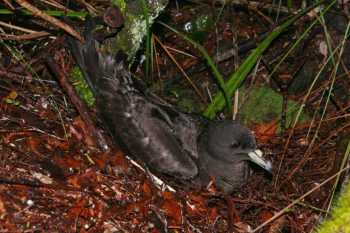On 16 September 2011 a meeting took place in Auckland, New Zealand the attendees at which have now formed the Black Petrel Action Group. This initiative was the result of the high level of concern raised by the publication of the Ministry of Fisheries Seabird Risk Assessment which identified the Black Petrel Procellaria parkinsoni as the most at-risk species from commercial fishing in New Zealand waters.
The ACAP-listed Black or Parkinson's Petrel or Titiako is a threatened migratory seabird which is an endemic breeder to New Zealand. Although it is known to migrate as far as Ecuador in South America it only breeds in colonies on two offshore islands in north-eastern New Zealand - Great Barrier Island (Aotea) and Little Barrier Island (Hauturu) in the Hauraki Gulf.
Black Petrels are currently listed as Vulnerable, with a decreasing population. The threats to Black Petrels occur both on land and at sea. On land, feral cats and pigs disrupt their burrows and are known to prey directly on eggs and chicks. At sea, Black Petrels are threatened by both commercial and recreational fishing activities. The birds are caught in fishing gear as they scavenge around fishing vessel waste, bait and fish. Much has been done to mitigate their terrestrial threats, but more action is required to ensure they are no longer threatened at sea.

Black Petrel. Photograph by Dave Boyle
Black Petrel Action Group Members:
BirdLife International and Forest & Bird (Contact: Karen Baird, Pacific Coordinator, BirdLife International Global Seabird Programme)
Great Barrier Island Charitable Trust (Contact: Kate Waterhouse, Trustee)
Little Barrier Island (Hauturu) Supporters Trust (Contact: Dr Matt Rayner, Trustee)
Ngati Rehua Trust Board (Chairperson: Rawiri Wharemate)
Wildlife Management International (Contact: Elizabeth Bell)
WWF-New Zealand (Contact: Victoria Travers, Programme Leader, Auckland Marine Matters)
Find the Black Petrel Action Group at its Facebook page.
Click here to access the ACAP Species Assessment for the Black Petrel.
Reference:
Richard, Y., Abraham, E.R. & Filippi, D. 2011. Assessment of the Risk to Seabird Populations from New Zealand Commercial Fisheries. Final Research Report for Ministry of Fisheries Projects IPA2009/19 and IPA2009/20. Wellington: Ministry of Fisheries. 66 pp.
John Cooper, ACAP Information Officer, 10 February 2012

 English
English  Français
Français  Español
Español